Keeping our research going during COVID-19
The COVID-19 lockdown has seen significant changes to our research at the Warwick Crop Centre, Wellesbourne Campus - but the dedication of our community is ensuring that critical work continues along with essential planning for the future.
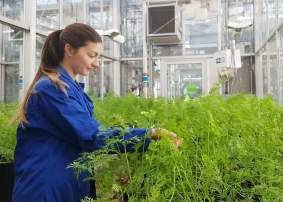
Our Horticultural Services team is busy looking after plants and supporting our researchers in their work. Essential daily duties are being carried out at our Phytobiology facility on the main campus whilst protected crops are being maintained in glasshouses and polytunnels at Wellesbourne by staff working on alternate days.
The field team have sown vital plots of carrots and swedes to maintain our pest populations in the
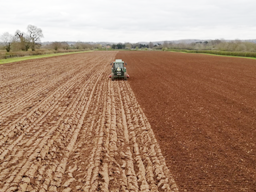
entomological study areas (which provide us with a formidable testing ground each year) and the plant disease quarantine field will see a cover crop sown across all disease areas to preserve and rest the soils until such time as we can start commence trials in that area again.
They have also been working to support the Arden Wildlife project ensuring optimum drilling of the wildflower strips to provide pollen and nectar habitats for insects and also bird feed seeds mix in readiness for autumn feeding for wild birds and some of the more rare breeds that can be spotted on site. This is in addition to the tree sparrow nesting boxes and Barn owl box which were recently erected. The field trials team also continue to maintain the Meteorological station on site in accordance with the Met Office contract..
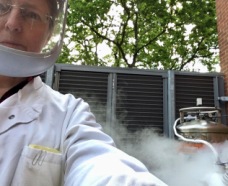
Technical support for critical work has also carried on, with a member of the team pictured filling up the liquid Nitrogen dispensing vessel from the external tank. This is to top-up our specialised facilities to maintain various samples, such as culture collections and plant pathogens, in long-term cold storage. It is an important weekly activity to replace the liquid nitrogen that continuously evaporates from these vessels.
Within the Insect Rearing Unit the Entomologists are maintaining a number of the most significant pest insects of horticultural crops in continuous culture so they are available for research studies. Many of these cultures have been maintained for a number of years and are irreplaceable. The insects kept will vary slightly from year to year depending on the emphasis of research but at the moment we are continuing to rear cabbage root fly (Delia radicum), onion fly (Delia antiqua), bean seed fly (Delia platura and Delia florilega), diamond back moth (Plutella xylostella), tomato moth (Tuta absoluta) and willow carrot aphid (Cavariella aegopodii). We also have several clones of currant lettuce aphid (Nasonovia ribisnigri), peach potato aphid (Myzus persicae) and cabbage aphid (Brevicoryne brassicae).
In addition to this insect work important and irreplaceable brassica virus cultures are being maintained. The turnip yellows virus isolates that we culture in Brussels sprout (Brassica oleracea) and oilseed rape (Brassica napus) plants are transmitted by aphids, in particular the peach-potato aphid (Myzus persicae) and cannot be stored. Hence it is essential to maintain them in live plants using the aphid vectors in order to support our research programme on natural resistances of plants to viruses
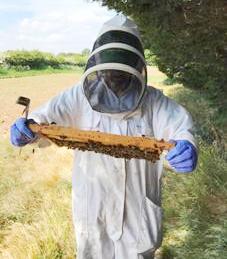
Our bee colonies are currently being looked after. New frames are in the process of being built and new hives sterilised ready to receive new colonies that are being delivered this month. We have also been seeing the rapid growth of the colonies from the original overwintered size, which is always exciting!
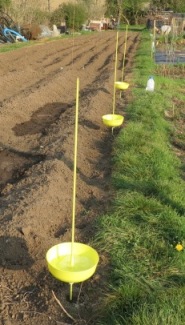
Insect forecasts are still being provided to the farming community to help inform pest control decisions and protect crops. Samples of insects collected from the suction trap located at Wellesbourne are sent to the Rothamsted Insect Survey for analysis and the information provided from this and the other suction traps in the network are disseminated to farmers and growers in a number of ways. Further insect traps are being supported on-site whilst others have been moved to more appropriate places during the lockdown, such as a nearby allotment (pictured). All of this information, plus the forecasts based on data from in-field weather stations, has been posted regularly in the AHDB Pest Bulletin and in the AHDB pest blog and highlighted in Twitter. In addition, we have continued to summarise information on diamond-back moth and silver Y moth activity from social media and citizen science web sites in northern Europe.
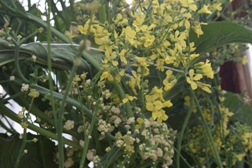
The UK Vegetable Genebank is carrying on its work of conserving diversity in vegetable crops. We have approximately 14,000 samples in our collection – covering a range of vegetables from cabbage to carrot to lettuce. Here pictured you can see plants of a French cauliflower variety called Cora in flower. We use flies to pollinate the flowers and get a good seed set. We will be harvesting the seed in June and weighing and processing it to put it back in our collections, making it available for plant breeding and research.
Here at the Crop Centre, our love of plants extends beyond our research and this is reflected in the other growing activities are community are undertaking during COVID-19.
